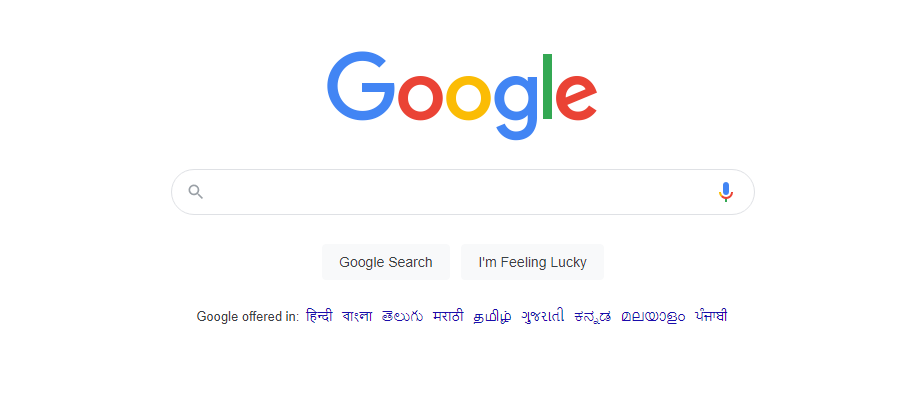Google Algorithm History
Google’s search engine was not nearly as strong or accurate in its early days as it is now; this was in the late 1990s & early 2000s when search engines were nothing more than keyword-matching & link-counting machines. Ranking high in search results may essentially be done by following a simple two-step procedure:
Everything You Needed To Know About Google’s Algorithm History
Step 1:- Incorporate your relevant keywords as many times as possible into your webpage.
Step 2:- Obtain as many inbound links as possible.
The joy wouldn’t continue for those early “SEO experts” who gamed the system, getting high ranks but offering little value to genuine searchers. Every time Google discovered a flaw in its capacity to produce relevant, high-quality search results, it implemented a solution to solve it.
Here’s a comprehensive rundown of Google’s recent algorithm changes, as well as some of its consequences for search & SEO.
2011 – Panda
Obviously, Google existed prior to 2011. We’ll begin with the Panda upgrade because it was the first big update in the era of modern SEO.’ Google’s Panda update attempted to deal with websites that were established just to rank in search engines.
It was mostly concerned with on-page elements. In other words, it analyzed if a website actually provided information regarding the search phrase used by users. The Panda upgrade targeted two categories of websites in particular:
Sites with affiliate links (sites that mainly exist to link to other pages).
Websites with relatively little content.
Google re-ran the Panda algorithm after its first release on a regular basis, and it was integrated into the core algorithm in 2016. The Panda update permanently changed the way we approach SEO since site owners could no longer get away with creating a site consisting of low-quality content.
2012 – Venice
Google’s algorithm upgrades Venice was a notable upgrade since it demonstrated that Google realized that searchers sometimes want results that are close to them. Following Venice, Google’s search results included pages depending on your IP address or the location you specified.
2012 – Penguin
Google’s Penguin update examined the connections that websites received from other websites. It determined if backlinks to a website were authentic or purchased in order to deceive search engines. In the past, many individuals paid for links as a quick way to improve their rankings. Google’s Penguin update attempted to discourage link purchasing, trading, and other forms of fake link creation.
If Google discovered fake links, it awarded a negative link value to the site in question rather than the vital positive link value it would have actually obtained. Since its first release, the Penguin update has been rolled out multiple times, and Google incorporated it into the core algorithm in 2016.
As you might expect, it mostly targeted websites with a high number of fake connections. They vanished from the search results as a result of the low-quality connections having a detrimental, rather than a positive, influence on their ranks.
Penguin has made a permanent update to link building: Obtaining low-effort purchased backlinks is no longer sufficient. Instead, you must concentrate on developing an effective link-building plan in order to obtain relevant links from reputable sites.
2012 – Pirate
The Pirate update addressed the unlawful distribution of copyrighted content. For the first time, it evaluated (many) DMCA (Digital Millennium Copyright Act) takedown requests for a website as a negative ranking factor.
2013 – Hummingbird
Google laid the basis for voice-search with the Hummingbird update, which was (and continues to be) more significant as more devices (Google Home, Alexa) use it. Hummingbird prioritizes each word in a query, ensuring that the whole search phrase gets considered rather than just certain phrases.
Why? To better comprehend a user’s inquiry and provide a response rather than merely a list of results. The impact of the Hummingbird update was unclear at first since it was not specifically meant to punish poor behavior.
In the end, it mostly reinforced the opinion that SEO material should be understandable, utilize natural language, and not be over-optimized for the same few phrases, but rather employ synonyms.
2014 – Pigeon
In 2014, Google Pigeon, a local SEO-focused upgrade, was released, which was another bird-related Google change. The Pigeon upgrade had an impact on both the search results pages and Google Maps.
It resulted in more precise localization, with results near the user’s location being prioritized. It also attempted to improve the relevance and quality of local results by considering organic ranking variables.
2014 – HTTPS/SSL
To emphasize the significance of security, Google decided to offer a little ranking boost to sites that successfully deployed HTTPS to protect the connection between the website and the user.
HTTPS was introduced at the time as a lightweight ranking signal. However, Google had previously hinted at the prospect of increasing the importance of encryption if webmasters had had the chance to install it.
2015 – Mobile Update
The SEO industry called this Google upgrade “Mobilegeddon” since they expected it to completely disrupt search results. By 2015, more than half of Google’s search inquiries were coming from mobile devices, which most likely prompted this upgrade.
The Mobile Update boosted the ranking of mobile-friendly websites in Google’s mobile search results. Despite its dramatic moniker, the mobile upgrade did not immediately disrupt most people’s ranks. Nonetheless, it was a significant move that foretold the growing prominence of mobility.
2015 – RankBrain
RankBrain is a cutting-edge Google algorithm that handles searches using machine learning. It can make educated assumptions about words it doesn’t recognize in order to identify terms with similar meanings and then provide appropriate results.
In order to improve, the RankBrain system reviewed previous queries and determined the top result. Its release represents yet another significant step forward in Google’s efforts to better interpret the meaning behind queries and offer the most relevant results.
Google disclosed in March 2016 that RankBrain was one of the three most essential ranking signals. Unlike other ranking variables, you can’t truly optimize for RankBrain in the usual sense, except by creating high-quality content. Nonetheless, its influence on the search results pages is apparent.
2016 – Possum
It was time for another local upgrade in September 2016. Google’s algorithm update Possum made various adjustments to Google’s local ranking filter in order to boost local search even more. After Possum, local results were more variable, based more on the searcher’s geographical location and query wording.
Following this modification, several companies who were not performing well in organic search found it simpler to rank locally. This showed that the modification made local searches less reliant on organic results.
2018 – (Mobile) Speed Update
Recognizing consumers’ desire for quick information delivery, Google performed this upgrade that made page speed a ranking criterion for mobile searches, as it already did for desktop searches. The upgrade mostly impacted sites that have an especially sluggish mobile version.
2018 – Medic
This broad core algorithm upgrade produced quite a stir among those affected, resulting in some ranking fluctuations. While a large number of medical websites were hit with lower rankings, the upgrade wasn’t entirely directed at them, and its specific goal is unknown.
It might have been an attempt to better match results to searchers’ intent, or it could have been an attempt to safeguard users’ well-being from (what Google determined to be) untrustworthy content.
2019 – BERT
Google’s BERT upgrade was billed as the “largest change in the previous five years,” affecting “one out of every 10 queries.” It’s actually a machine learning algorithm, a neural network-based natural language processing approach (NLP). BERT stands for Bidirectional Encoder Representations from Transformers.
BERT can determine the whole context of a word by looking at the words before and following them. In other words, it employs the context and relationships of all the words in a phrase rather than ordering them one by one. This equates to a significant improvement in deciphering a search query and its purpose.
2021 – Page Experience Update
The Page Experience upgrade, which will be rolled out gradually until 2021, adds a new ranking signal that includes “measures that assess real-world user experience for loading performance, interaction, and visual stability.”
Page experience isn’t a brand-new ranking signal. Existing page experience signals will be merged with Core Web Vitals, real-time measurement of critical user experience parameters, in this version. In summary, the Page Experience change indicates that Google will adopt a more holistic approach to on-page user experience.
According to Google, these new Page Experience characteristics are still less significant than “having amazing, relevant content.” Google has added dedicated capabilities to Search Console to help you monitor your Core Web Vitals and Page Experience and make meaningful adjustments.
Google’s Algorithm Updates: What To Expect
Google has evolved significantly since the early 2010s. Its first big modifications in the decade were aimed at combating spammy results and sites attempting to game the system. However, as time went on, changes contributed more and more to search results that were tailored to offering desktop, mobile, & local searchers precisely what they were searching for.
The page experience ranking element, of course, will fit quite perfectly there. While the algorithm was already powerful, the enhancements throughout the years, such as machine learning and NLP, have elevated it to the cutting edge.
With the continued emphasis on purpose, Google Search’s algorithm will probably continue to focus on refining its understanding of search queries and decorating the results pages accordingly.
This appears to be their current focus as they strive to achieve their aim of “organizing the world’s knowledge & making it widely accessible and valuable.” But, no matter which path it takes, the best outcome and focusing on having an exceptional site will always be the greatest way to proceed!




